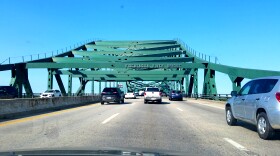This boat could only have one name, right?
“Welcome aboard the Royal Flush,” Captain Bob Gibbons says as a reporter hoists a leg over the rail of the 30-foot aluminum boat.

This craft, owned by the state and docked seasonally near the salt piles along the Piscataqua River in Portsmouth, has a simple mission: In the warmer months, Gibbons, along with another pilot, siphons off human waste from pleasure boats along New Hampshire’s coastline, in Great Bay and the Cocheco River.

Armed with a 400-gallon storage tank and a pump that can move sewage at a rate of 40-gallons a minute, the Royal Flush gathers “black water” - the waste gathered in the boat latrines - so that boaters aren’t tempted to dump it into the ocean.
When a reporter notes no foul odors aboard, Gibbons seems proud.
“Thank you,” he responds. “That’s a good thing, because that means there aren’t any leaks.”
The Royal Flush’s job might be an essential one on the high seas, but it’s an obvious target for bathroom humor. Gibbons, though, a former charter boat operator and a capable, sober seaman, isn’t interested.
“There are many jokes,” he says. “And I’m just going to leave it at that.”
Despite his all-business demeanor, Captain Bob has earned a following out here on New Hampshire's waters. Each day, he will hook up with up to a dozen or so boats who have requested what’s officially known as a “pumpout.”
“Some of my best friends are customers,” he says. “I’ve been servicing the same boats for many years, and some of those people are great clients of mine.”
Though it may be fine for pirates, it is illegal (and fairly disgusting) to dump waste within three miles of the shoreline in New Hampshire. While some marinas have locations where a boat can pump out, that isn’t always an option.
With backing from a federal grant, the state operates the Royal Flush, and contracts with Gibbons, to offer a free way for crafts to unload without polluting.
“Over the years, we’ve pumped out a total of 200,000 gallons of sewage from boats, and it averages about 10,000 to 15,000 gallons a year,” says David Neils, the state’s Chief Aquatic Biologist. “So that's a lot of poop.”

When too much sewage ends up in the water, it can harm the ocean’s delicate ecosystem.
And think about the oysters, lobsters and other delicacies harvested right off the coast that end up on our plates.
“Human sewage is not good for them, no, and it isn’t good for us either,” says Neils. “So we look at this program as a critical way to protect human health and protect our recreation resources here in New Hampshire.”
After firing up the Royal Flush’s twin outboards, Gibbons heads upriver and into Great Bay. He’s looking for a 34-foot bayliner with blue canvas who requested a pump the day before.
The hardest part of the job is docking up dozens of times a week against $100,000 boats that damage easily. For that reason, the Royal Flush doesn’t operate in foul weather or when the seas are rough.
But Gibbons is a pro; he nestles alongside the client, attaches a yellow hose, and soon a tankful of sewage is moving swiftly from one boat to another.
“And by the way: I have never gotten dirty doing this job. Never gotten any splash. Nothing has ever touched me, and I hope I am not jinxing myself when I say that,” he says.
Job complete, Gibbons leaves a note for the boater, and heads with the tide toward his next pumpout of the day – making a dirty job look clean.








